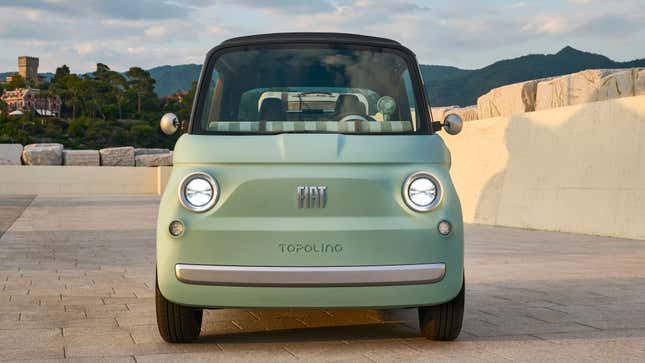
If you’re not familiar with the Fiat Topolino, you’re probably not the only one. It’s a tiny electric city car that is based on the Citroen Ami and not sold in the U.S. In fact, even calling it a city car is a stretch because it’s technically considered a quadricycle that only has a 46-mile range and a top speed of 28 mph. As Motor1 reports, the Fiat Topolino is also illegal in Italy thanks to one tiny design decision that led to 134 Topolinos being seized by authorities.
So why is Italy so mad at Fiat, an Italian automaker? Well, as it turns out, Fiat put a tiny Italian flag on the Topolino near the door handle. Arguably, it’s barely even a flag — it’s basically just a thin green, white and red stripe — but that was still a step too far for the Italian government. You see, the Topolino isn’t built in Italy and is actually assembled in Morocco. And under Italian law, you can’t put an Italian flag on a product not made in Italy even if the company making the product is Italian.
Considering Italy’s far-right shift following the election of Giorgia Meloni, it would be understandable if you assumed this was a new law implemented to Make Italy Great Again, but that’s not actually the case. The law in question reportedly passed more than 20 years ago back in 2003 and states:
The import and export for the purpose of commercialization or the marketing or commission of acts directed unambiguously to the marketing of products bearing false or misleading indications of provenance or origin constitutes a crime and is punishable under Article 517 of the Penal Code.
It constitutes a false indication to stamp ‘made in Italy’ on products and goods not originating in Italy within the accordance with European regulations on origin. It constitutes a fallacious indication, even if the origin and provenance are indicated as foreign origin of the products or goods. The offender is punished with an administrative fine from 10,000 euros to 250,000 euros.
Apparently, Fiat added the small badge because the Tipolino was developed in Turin, Italy. The automaker also told La Repubblica that it, “believes, with respect to the fact that a small sticker bearing the colors of the Italian flag affixed to the doors could constitute a false indication of the origin of the goods, that it has operated in full compliance with the regulations.” Still, the Italian automaker has agreed to remove the badges to make the Italian government happy.







